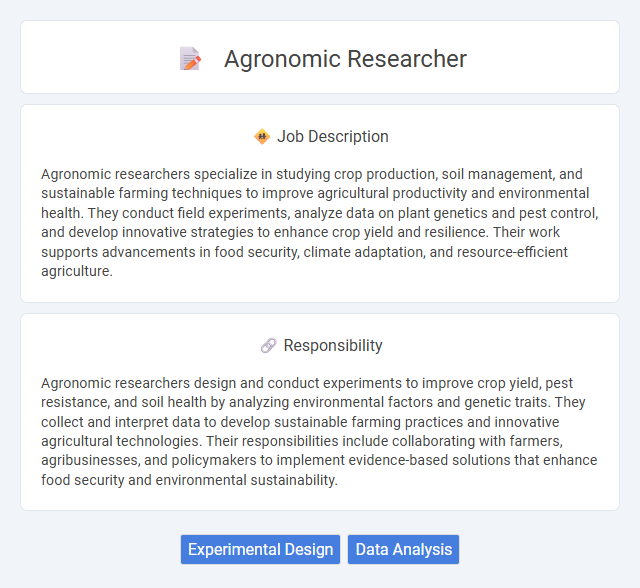
Agronomic researchers specialize in studying crop production, soil management, and sustainable farming techniques to improve agricultural productivity and environmental health. They conduct field experiments, analyze data on plant genetics and pest control, and develop innovative strategies to enhance crop yield and resilience. Their work supports advancements in food security, climate adaptation, and resource-efficient agriculture.
Individuals with a strong interest in plant science and sustainable agriculture are likely suitable for a career as agronomic researchers, as the role demands analytical skills and a dedication to improving crop yields. Candidates who enjoy conducting field experiments, working with data, and collaborating with farmers may find this job fulfilling and well-aligned with their abilities. Those uncomfortable with extensive outdoor work or the detailed scientific analysis required might find the position less suitable.
Qualification
Agronomic researchers typically hold advanced degrees such as a Master's or Ph.D. in agronomy, plant science, or related fields, emphasizing expertise in crop production, soil science, and pest management. Strong analytical skills, proficiency in experimental design, and experience with field trials and data analysis software are essential qualifications. Knowledge of sustainable agriculture practices and the ability to collaborate with interdisciplinary teams enhance research effectiveness and innovation.
Responsibility
Agronomic researchers design and conduct experiments to improve crop yield, pest resistance, and soil health by analyzing environmental factors and genetic traits. They collect and interpret data to develop sustainable farming practices and innovative agricultural technologies. Their responsibilities include collaborating with farmers, agribusinesses, and policymakers to implement evidence-based solutions that enhance food security and environmental sustainability.
Benefit
An agronomic researcher will likely benefit from gaining advanced knowledge in crop science and sustainable farming practices. This role probably offers opportunities to contribute to innovative agricultural solutions, enhancing food security and environmental health. Access to cutting-edge technology and collaboration with interdisciplinary teams may further improve career development and job satisfaction.
Challenge
Agronomic researchers likely face the challenge of developing sustainable crop production methods amid changing climate conditions and limited natural resources. Balancing the need for increased agricultural yields with environmental conservation could require innovative experimentation and data analysis. Navigating complex regulatory frameworks and funding constraints may also present significant obstacles in advancing agronomic solutions.
Career Advancement
Agronomic researchers drive innovation in crop production by analyzing soil, climate, and plant genetics to enhance sustainable farming practices. Career advancement often involves progressing from field research to leadership roles in project management, research development, or policy advising within agricultural organizations or academic institutions. Earning advanced degrees, publishing influential studies, and securing grants significantly boost opportunities for senior scientist or director positions.
Key Terms
Experimental Design
Agronomic researchers specializing in experimental design develop and implement rigorous field and laboratory experiments to evaluate crop performance, soil health, and sustainable farming practices. They apply statistical methods and data analysis techniques to optimize treatment variables, ensuring reliable and reproducible results that advance agricultural productivity. Expertise in randomized complete block designs, factorial experiments, and split-plot layouts is essential to accurately assess agronomic interventions and environmental factors.
Data Analysis
Agronomic researchers specializing in data analysis utilize advanced statistical tools and machine learning algorithms to interpret crop performance, soil health, and environmental variables. They compile and analyze large datasets from field trials, remote sensing, and sensor technologies to optimize agricultural practices and improve yield predictions. Their expertise in data visualization and database management supports evidence-based decision-making for sustainable farming solutions.
 kuljobs.com
kuljobs.com